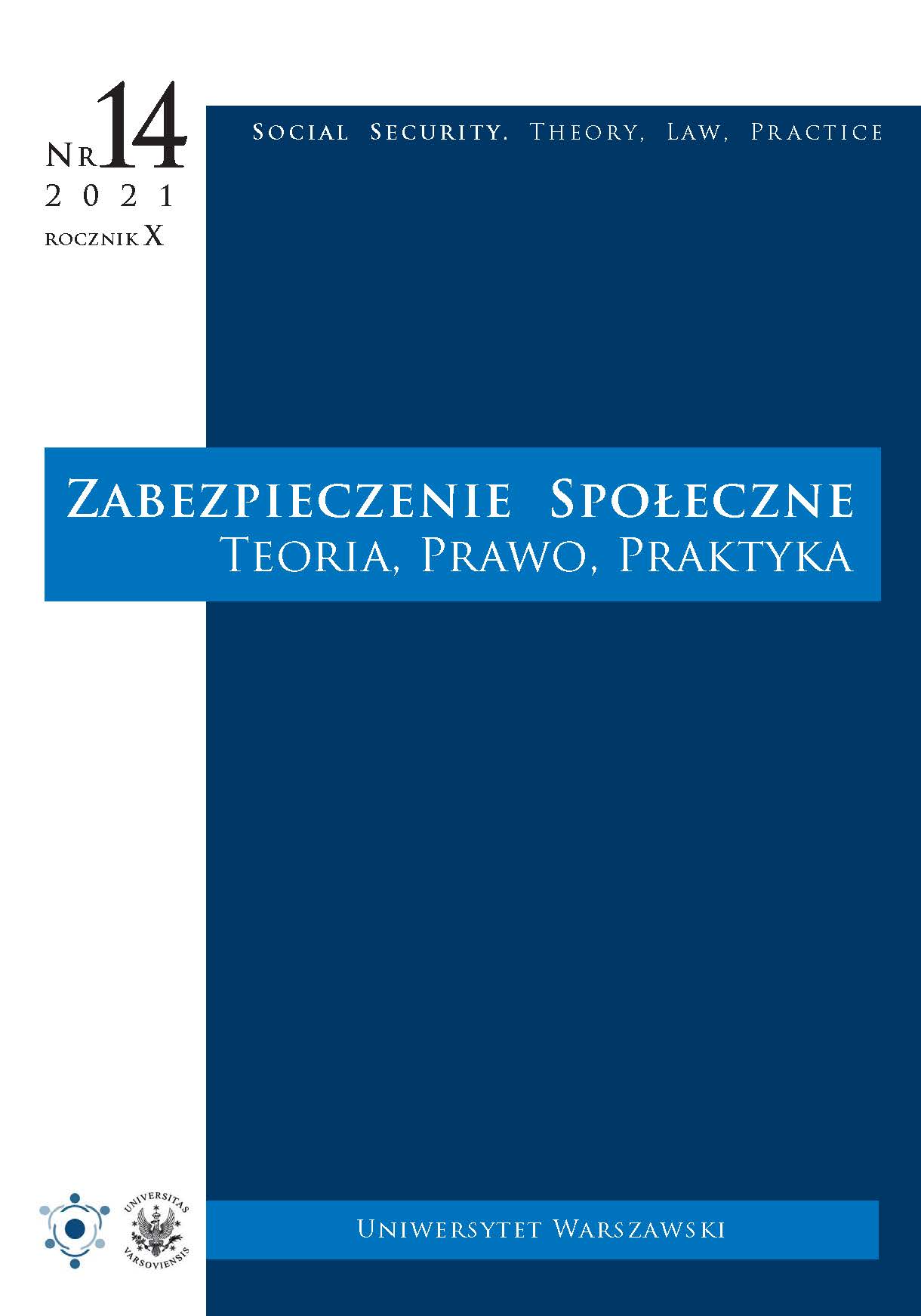The consequences of the COVID-19 pandemic on social functioning of persons with disabilities
Keywords:
persons with disabilities, Covid-19, threats, workplaceAbstract
According to the 2011 “World Disability Report” prepared by the World Bank, persons with disabilities represent 15% of the global population. These persons are at risk of social, economic and health marginalisation, which was particularly worsened during the COVID-19 pandemic. The article presents the results of the research carried out by the State Fund for Rehabilitation of Disabled Persons in Poland on resents the results of the research carried out by the State Fund for Rehabilitation of Disabled Persons in Poland on activities related to the protection of employees and the maintenance of jobs for persons with disabilities during the ctivities related to the protection of employees and the maintenance of jobs for persons with disabilities during the Covid-19 pandemic.
References
Alexander David, Sagramola Silvio. Major Hazards and People with Disabilities: Their Involvement in Disaster Preparedness and Response.
Strasbourg: European and Mediterranean Major Hazards Agreement, Council of Europe, 2014, www.coe.int/t/dg4/
majorhazards/ressources/pub/MajorHazards_Disability_2014_en.pdf.
Asbury Kathryn et al. How is Covid-19 Affecting the Mental Health of Children with Special Educational Needs and Disabilities and Their Families?, “Journal of Autism and Developmental Disorders” 2021, No 51, p. 1772–1780, doi: 10.31234/osf.io/sevyd.
Bignal Thomas, Gouvier-Seghrouchni Rym. The impact of Covid-19 on disability services in Europe, EASPD Snapshot Report. Brussels: European Association of Service Providers for Persons with Disabilities, 2020.
Boyle Coleen A. et al. The public health response to the COVID-19 pandemic for people with disabilities, “Disability and Health Journal” 2020, Vol. 13, Issue 3, No. 100943, doi: 10.1016/j.dhjo.2020.100943.
Jagura Jarosław. Domy pomocy społecznej w dobie pandemii. Doświadczenia, potrzeby, wyzwania, Warszawa: Helsinska Fundacja Praw Człowieka, 2020, https://www.hfhr.pl/wp-content/uploads/2020/11/Domy-pomocy-spolecznej-w-dobie-pandemii-19-11.pdf.
Łapińska Iwona, Zawadzka-Głos Lidia. Problemy laryngologiczne występujące u dzieci z zespołem Downa, „Nowa Pediatria” nr 2 (2016).
Prokopiak Anna. „Autyzm a odżywianie. O czym nauczyciel wiedzieć powinien”. Lubelski Rocznik Pedagogiczny nr XXXII (2013).
Raport. Działania związane z epidemią COVID-19 podejmowane przez pracodawców zatrudniających osoby niepełnosprawne. COVID-19. Ochrona pracowników. Utrzymanie zatrudnienia. Warszawa: PFRON, 2020, https://www.pfron.org.pl/fi leadmin/News/centralne/ 2020/2020-07-27_Raport_covid/RaportBadaniePracodawcow_Covid19.pdf?utm_campaign=pfron&utm_source= df&utm_medium=download.
Safta-Zecheria Leyla. Challenges posed by Covid-19 to the health of people with disabilities living in residential care facilities in Romania, “Disability and Society” 2020, nr 35(5).
Toseeb Umar et al. Supporting families with children with special educational needs and disabilities during Covid-19, Working Paper, PsyArXiv Preprints 2020, doi: 10.31234/osf.io/tm69k.
Winczura Barbara. Disorders Co-Occurring with Autism – Developmental Conditions, Clinical Symptoms and Diagnostic Dilemmas, ORCID ID: https://orcid.org/0000-0001-8619-3357.
STRONY INTERNETOWE/WEB SITE

Downloads
Published
Issue
Section
License
This article is published under the Creative Commons Attribution 4.0 International (CC BY 4.0) license.
Full license text: https://creativecommons.org/licenses/by/4.0/
The author retains copyright and grants the editorial office a non-exclusive license to publish the article.
